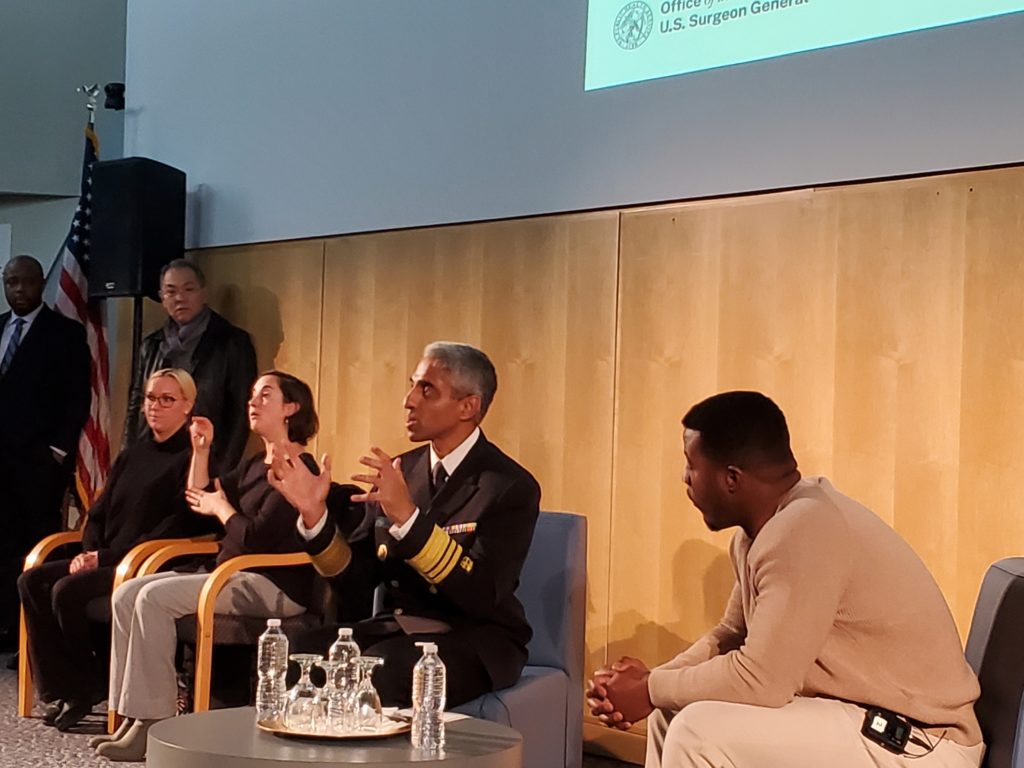
U.S. Surgeon General Dr. Vivek Murthy (left) interviews actor and mental-health advocate Daniel Ezra (right) during his stop at Camden County College on Nov. 28.
U.S. Surgeon General Dr. Vivek Murthy came to Camden County College’s Blackwood campus late last month, one of eight stops on his national “We Are Made To Connect” college tour.
He had also stopped at Duke University, the University of Washington, University of Texas, Arizona State University, NYC students in Brooklyn, NY, Drexel and Hampton University in Virginia.
As part of the tour, students were invited to participate in Murthy’s 5-for-5 Connection Challenge to take five actions for five days that express gratitude, offer support or seek help from people in their lives to encourage connections and combat an epidemic of loneliness and isolation.
The students got action cards to track their progress over the five days, as well as connection cards with prompts to facilitate connection in different forms, including expressing gratitude, giving and receiving support and deepening relationships. There were also some self-reflective exercises.
“(Loneliness) is an issue with real problems and consequences,” Murthy noted. “When people struggle from being socially disconnected from other people, over time that has an impact. It increases your risk of depression and anxiety and suicide, but also it increases a risk of physical health as well, like heart disease, stroke and dementia and premature death.”
In a dialogue with mental-health advocate Daniel Ezra, Murthy addressed the importance of social connections, social media’s impact, and ways to improve quality time with others. Ezra is best known for his role as Spencer James on TV’s “All American.”
Murthy emphasized that those struggling with loneliness are not alone.
“I find it helpful to think of loneliness as a signal, like hunger or thirst, that our body sends us when we’re missing something we need for our survival,” Murthy explained. “If we meet that need by reaching out or building new connections, that sense of loneliness might go away. But if it persists in the same way that dehydration or starvation may hurt our bodies, prolonged loneliness may hurt us too.”
Ezra and Murthy agreed that the quality of relationships is more important than quantity and that small things make a big difference, like checking in on a friend or taking a moment to say hi.
As for social media, Ezra acknowledged its roots in “instant gratification” and highlighted the importance of exercising discipline online. For him, that means not checking his phone first thing in the morning, keeping it away during in-person interactions and not reading online comments – all to protect his mental health.
“For me as an artist, a lot of my best ideas and inspiration come from people watching or daydreaming,” Ezra noted, “those moments in between moments when the person I’m out to dinner with goes to the bathroom, and instead of pulling out my phone, I just sit and watch to see what’s happening and I might have a whole idea for something.”
Murthy also advised having and protecting tech-free zones throughout the day to help prioritize in-person experiences .
The state offers a number of resources to help with mental health, including the 24/7 mental-health hotline, 988 and the UWill program for students to choose a therapist at app.uwill.com.
To learn more about the surgeon general’s advisory on loneliness and isolation, visit https://www.hhs.gov/sites/default/files/surgeon-general-social-connection-advisory.pdf.
To participate in the 5 for 5 Connection Challenge, go to https://www.hhs.gov/surgeongeneral/priorities/connection/challenge/index.html.


